An uneasy truce between Kurdish and Syrian government supporters appeared to have broken down into heavy clashes and the deaths of at least a dozen people as a new front threatened to open in the war in northern Syria.
Militias supporting the government of Bashar al-Assad on Wednesday clashed with Kurdish fighters in Qamishli, the unofficial capital of the Kurdish areas of Syria.
Kurds said the fighting started after militiamen supporting Assad attempted to arrest a Kurdish policeman at one of the many checkpoints separating government and Kurd-held areas, leading to battles across the town and claims by Kurdish forces that they had “liberated” several areas.
Fighting continued on Thursday as civilians began fleeing the town, fearing further escalation.
The Kurdish frontlines were quickly bolstered by fighters from various elements of the “Syrian Democratic Forces,” a coalition of pro-Kurd militants including the YPG, its female offshoot the YPJ, and the paramilitary Asayish police force.
Government jets could be seen in the sky as civilians ran for safety, and Kurdish forces responded with heavy weapons fire on government militiamen near the Alaya prison.
“Get down, get down,” a Kurdish fighter yelled while opening fire on Syrian army positions in the town.
“Today the regime tried to take control of Qamishli. Three of my comrades were killed. Today the YPG, YPJ and Asayish are all resisting the regime,” said Mem Hussein, a 28-year-old Asayish officer.
“Ten regime fighters were killed, and 45 were arrested,” he added. “Some areas under control of the regime for four years were liberated. The Alaya prison was liberated.”
Mohammed Hessi, a journalist from Welat FM radio station, said the clashes were not the first, but were by far the heaviest in recent months.
“The clashes started when they stopped a car of the Asayish and shot at civilians. After that the Asayish responded,” he told MEE. “The regime wants to stop the clashes, but the YPG will continue to fight them,” he added.
Mixed areas in Qamishli, in Hasakah province, have been relatively quiet in recent months despite fighting in the north of Syria. Syrian government forces have controlled the area’s main airport, and supporters hold sway in some Arab and Christian areas, while the Kurds have administered their own areas.
However, Kurds said the recent declaration of a Kurdish federation in the north of Syria has led to attempts by Assad supporters to reassert the government’s authority.
Barham Demhat, a member of an armed Kurdish youth movement, told MEE that the government opposed Kurdish rights.
“The regime wants to prevent Kurdish rights. It is not happy with Kurds having self-rule, that’s why it is angry,” he said.
“It wants to fight, but no one is scared, and even if it’s heavier, [my] comrades are much smarter.”
Analysts suggested the clashes were also related to increased US support for the Kurdish forces.
“The source of the fighting is a local turf war, but the geopolitical context is important,” a Washington-based Middle East researcher at the Centre for a New American Security (CNAS) told MEE.
“The more powerful and entrenched the Syrian Democratic Forces become in Hasakah, particularly the oil-rich areas around Qamishli, the more difficult it will be for the regime to remove it in a post-conflict situation.”
“Assad views the Syrian Democratic Forces coalition as a looming threat that provides the US with long-term military influence on the ground inside of Syria. This situation would strongly challenge the regime’s long-term ability to regain unitary control over all of Syria.”
The Syrian government has not released any information or statements about the fighting in Qamishli. Despite apparently providing air support, it was mainly militias aligned with Assad, rather than regular forces, who were fighting the Kurds.
“This is not the first time there have been clashes,” said Abdulselam Mohammed, a 30-year-old teacher, as gunfire could be heard in the background.
“The regime did not attack directly, but uses its allies, the masked men who are Baath Arabs,” he said.
Kurdish forces confirmed there were almost no clashes with the regular Syrian army. “There was no fighting near the airport,” said Nazdar Sulaiman, a member of the Asayish. He added, however, that the government-held Alaya prison “was surrounded by our forces”.
Leith Abou Fadel, editor-in-chief of the pro-government, English-language Syrian Arabic news website al-Masdar, said pro-Assad National Defence Forces, led by parliamentary candidate Muhamed Faris, were the main protagonists.
“Arab tribes in Qamishli and Kurds have never really gotten along. So something as simple as the Asayish failing to stop at a checkpoint triggered violence,” he told Middle East Eye.
He said he doubted whether the clashes would result in an all-out assault by regular Syrian army units.
“Today’s battles were definitely heavier, but it seemed to be a more personal battle than an actual ideological fight,” he said.
“We will likely see an increase in these skirmishes; however, they never last long because the Syrian government and [Kurdish politicians] usually get involved and force each side to end the fighting.”
[Source: MEE]





 WhatsApp us
WhatsApp us 

